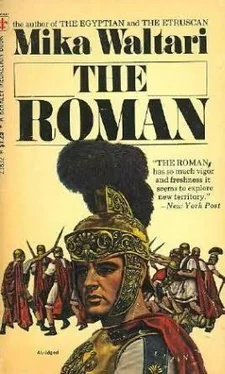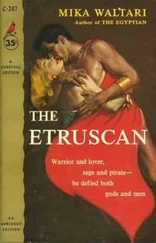Mika Waltari - The Roman
Здесь есть возможность читать онлайн «Mika Waltari - The Roman» весь текст электронной книги совершенно бесплатно (целиком полную версию без сокращений). В некоторых случаях можно слушать аудио, скачать через торрент в формате fb2 и присутствует краткое содержание. Жанр: Исторические приключения, на английском языке. Описание произведения, (предисловие) а так же отзывы посетителей доступны на портале библиотеки ЛибКат.
- Название:The Roman
- Автор:
- Жанр:
- Год:неизвестен
- ISBN:нет данных
- Рейтинг книги:4 / 5. Голосов: 1
-
Избранное:Добавить в избранное
- Отзывы:
-
Ваша оценка:
- 80
- 1
- 2
- 3
- 4
- 5
The Roman: краткое содержание, описание и аннотация
Предлагаем к чтению аннотацию, описание, краткое содержание или предисловие (зависит от того, что написал сам автор книги «The Roman»). Если вы не нашли необходимую информацию о книге — напишите в комментариях, мы постараемся отыскать её.
The Roman — читать онлайн бесплатно полную книгу (весь текст) целиком
Ниже представлен текст книги, разбитый по страницам. Система сохранения места последней прочитанной страницы, позволяет с удобством читать онлайн бесплатно книгу «The Roman», без необходимости каждый раз заново искать на чём Вы остановились. Поставьте закладку, и сможете в любой момент перейти на страницу, на которой закончили чтение.
Интервал:
Закладка:
“Leave me to my misery,” he pleaded. “I’d rather go to prison, give up my knighthood and pay the fines than have to face that false woman again. She must have poisoned me and mixed something shameful in my wine for me to have been so out of my mind. I remember almost nothing of what happened.”
Everything could be straightened out, the lawyer assured him, and promised to defend him at the trial. Then Aunt Laelia intervened, stamping her foot and weeping, burning red patches appearing on her cheeks.
“You must not sully the good name of Manilianus with another shameful case, Marcus!” she cried. “Be a man for once and stand by what you have done.”
Weeping, I supported Aunt Laelia’s demand and cried that such a case would also make me look foolish all over Rome and would ruin my future. I begged that we should all go to Tullia’s house at once. I promised that I would go down on my knees beside my father in front of this beautiful and noble lady and beg her forgiveness.
My father was unable to withstand us. Followed by the magistrate and the policemen, we went to Viminalis hill, the slaves in the rear carrying my father’s things because no one had thought to order them to turn around and go back home. Valeria Tullia’s house and garden were immensely large and magnificent. In the columned courtyard we were met by a giant doorkeeper dressed in green and silver. He greeted my father respectfully.
“Oh, my lord,” he cried. “You are welcome back to your house. My mistress is impatiently awaiting you.”
With a final glance of despair, my father weakly asked us to wait for him in the courtyard and then went on in alone.
A whole flock of slaves came hurrying out to offer us fruit and wine from silver vessels. Aunt Laelia looked cheerfully about.
“There are some men who don’t know what’s good for them,” she remarked. “I can’t think what Marcus can have to complain about in a house like this.”
Soon Tullia came running out to greet us, dressed in nothing but a transparent shift of silk, her hair neatly combed and her face painted.
“I’m so pleased,” she cried joyfully, “that Marcus has returned to me so soon and has brought his things with him too. Now he need never go away from here again, but we can live happily together for the rest of our days.”
She ordered a purse of soft red leather to be handed to the magistrate as compensation for his trouble, and then said ruefully, “Of course in my heart I did not doubt Marcus for a moment, but a lonely widow has to be careful, and in his younger days Marcus was quite fickle. I am delighted that he has now brought his lawyer with him so that we can draw up the marriage contract at once. I wouldn’t have imagined, dear Marcus, that your wits were ordered to that extent, so disordered were they in my bed last night.”
My father cleared his throat and swallowed, but not a word was forthcoming. Tullia took us into her large rooms and let us admire the mosaic floor, the murals and the beautifully proportioned panels. She let us look into her bedroom, but pretended to be shy, covering her face.
“No, no,” she cried. “Don’t go in there. Everything is in disorder after last night.”
My father at last managed to find his voice.
“You have won, Tullia,” he snapped, “and I submit to my fate. But at least send the magistrate away so that he need no longer witness my degradation.”
Handsomely dressed slaves hovered around us and did their best to serve and please us. Two small naked boys were running about the house playing at cupids. I was afraid that they would catch cold until I realized that the stone floor in this magnificent house was heated by hot pipes. The magistrate and my father’s lawyer consulted together for a while and decided that a promise of marriage given in the presence of witnesses was legally valid without a public marriage. The magistrate and his policemen left when he had been convinced that my father was prepared to sign a marriage contract without protest. The lawyer made the magistrate promise to keep silent about the whole affair, but even I with my scant sense realized that a person in his position could not possibly resist passing on such a delicious piece of scandal.
But was it in fact a scandal? Was it not flattering for my father that such a noble and obviously immensely rich woman would stop at nothing to marry him? Despite my father’s modest habits and outward humility, he must have possessed hidden qualities of which I knew nothing and which would certainly rouse the curiosity of the whole of Rome, both about him and also about me. In fact this marriage could be to my advantage in every way. At least it would force my father to stay in Rome for the time being so that I need not drift about in this city in which I still felt insecure.
But what could the beautiful pampered Tullia see in my father? For a moment I was seized with the suspicion that she led a frivolous life and was up to her ears in debt and so wanted my father’s money. But in fact my father was not especially rich by Rome’s standards, although his freedmen in Antioch and elsewhere in the East were wealthy. My suspicions were allayed when my father and Tullia, in complete agreement, decided to make the marriage contract so that even in the future they would each keep control of their own fortunes.
“But whenever you have the time or feel like it, dear Marcus,” suggested Tullia mildly, “I hope you will talk to my treasurer and go through my accounts and give me advice about my affairs. What does a simple widow understand about such things? I have heard it said that you have become a clever businessman, although no one would have suspected it of you in your youth.”
My father remarked in annoyance that now that law and order reigned in the country, thanks to Emperor Claudius and his freedmen, a sensibly placed fortune grew by itself,
“But my head is empty and I have not a single sensible thought left,” he said, scratching his chin. “I must go to the barber and the baths to rest and collect what is left of my wits.”
But Tullia led us straight past the marble statues and wells in the vast inner courtyard of the house, over to its far side where she showed us her own bathhouse with hot and cold pools, steam room and cooling room. A barber, a masseur and a bath-slave were all waiting there ready to serve us.
“You need never again pay a single denarius to the clothes-minders at the public baths, or expose yourself to the crush and smell of the people,” Tullia explained. “If you feel like reading, poetry or music after your bath, there is special room here for that purpose. Go now, Marcus and Minutus, and bathe, while I consult with my dear friend Laelia on how we shall arrange our lives from now on. We women understand such things better than you impractical men.”
My father slept until sunset. When we had dressed in the new clothes the clothing steward had laid out for us, the house was suddenly filled with guests. Most of them were quite young, happy and cheerful people, but among them were also two fat old men of debauched appearance whom I could not respect although one of them was a senator. I could at least talk about horses to a senior centurion from the Praetorian Guard, but to my surprise he showed a much greater interest in the women who, after drinking wine without restraint, loosened their clothes to be able to breathe more freely.
When I noticed which way this marriage feast was developing, I went to find Barbus, whom the servants had been generously regaling. He was holding his head and said, “I have experienced greater hospitality licit: than I have ever known before and would Have even been married oil’ in a flash if I hadn’t, as an old veteran, known when to call a halt. This house is no place for you, Minutus, nor for an old soldier like me either.”
Читать дальшеИнтервал:
Закладка:
Похожие книги на «The Roman»
Представляем Вашему вниманию похожие книги на «The Roman» списком для выбора. Мы отобрали схожую по названию и смыслу литературу в надежде предоставить читателям больше вариантов отыскать новые, интересные, ещё непрочитанные произведения.
Обсуждение, отзывы о книге «The Roman» и просто собственные мнения читателей. Оставьте ваши комментарии, напишите, что Вы думаете о произведении, его смысле или главных героях. Укажите что конкретно понравилось, а что нет, и почему Вы так считаете.











